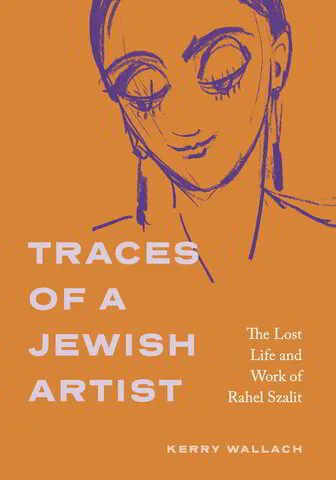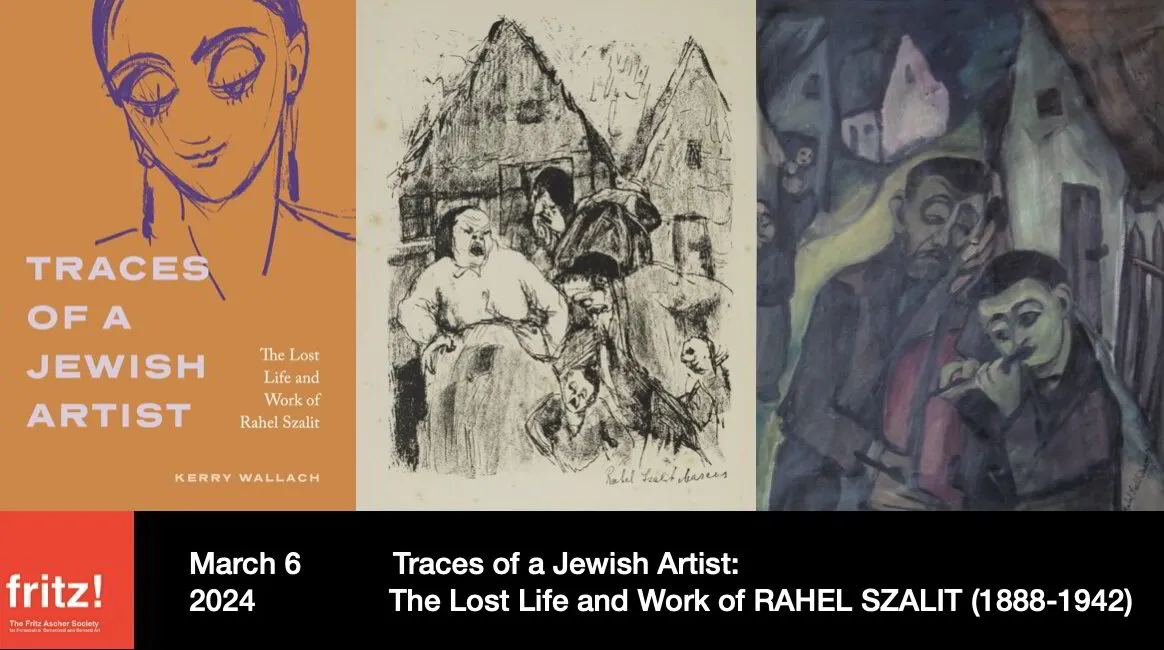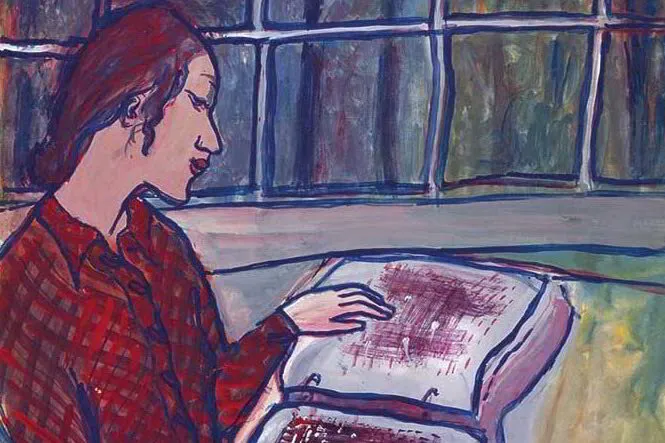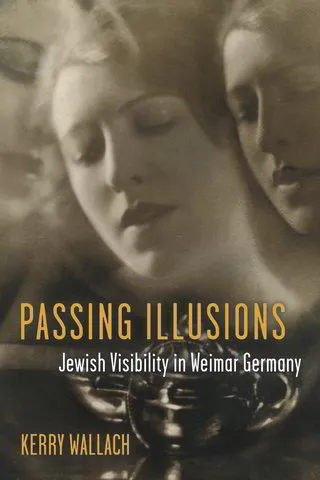Events
Book Talk
Traces of a Jewish Artist:
The Lost Life and Work of Rahel Szalit
Webinar - Yiddish Book Center
May 30, 2024, 7pm Eastern
Book Talk
Traces of a Jewish Artist:
The Lost Life and Work of Rahel Szalit
Webinar - Fritz Ascher Society for Persecuted, Ostracized and Banned Art
March 6, 2024, 12-1pm Eastern
Read more or Watch a recording of this event
Book Launch
German-Jewish Studies:
Next Generations
Online Event hosted by
Leo Baeck Institute Jerusalem
Jan. 23, 2023, 1pm Eastern
Watch a recording of this Zoom event
Book Launch: The Oxford Handbook of the Weimar Republic
Zoom Event hosted by Gettysburg College, Feb. 22, 2022, 3:30pm
Please join us for the US virtual book launch of The Oxford Handbook of the Weimar Republic.
Nadine Rossol (University of Essex), Erin Hochman (Southern Methodist University), and Kerry Wallach (Gettysburg College) in conversation with Helmut Walser Smith (Vanderbilt University).
See also the German version: Aufbruch und Abgründe: Das Handbuch der Weimarer Republik.
The Jewish Renaissance in Weimar Germany
Zoom Panel, Leo Baeck Institute – New York|Berlin, Oct. 19, 2021, 2-3:30pm
Read more or watch a recording of this webinar
As the LBI's Shared History Project enters its chapter on the Weimar Republic and the beginning of National Socialism, panelists will discuss how German-speaking Jews seized on the era of cultural freedom ushered in by the Weimar Republic to rediscover, revitalize, and transform Jewish culture and identity in a modern context.
Michael Brenner (American University/Munich), Rachel Seelig (University of Toronto), and Kerry Wallach (Gettysburg College) will discuss how diverse strains of Jewish culture – religious and secular, Zionist and non-Zionist, speaking German, Yiddish, and Hebrew – found expression in arts, literature, society, and politics. Miriam Rürup (Moses Mendelssohn Center Potsdam) will chair.
A Conversation on Charlotte Salomon
Zoom Webinar, April 20, 2021
Watch a recording of this webinar (Presentation on Rahel Szalit runs from minute 6 to 16:30)
Read more about this event
A conversation with Griselda Pollock (University of Leeds, UK) and Kerry Wallach (Gettysburg College, PA) about the work and life of the Berlin-born Jewish artist, Charlotte Salomon (1917–1943). Moderated by Michael Riff.
Kerry Wallach brings to the conversation insights that she has gained from her research on German-Jewish culture as well as new ones related to the preparation of the first book-length study of East European-born Jewish artist and illustrator Rahel Szalit-Marcus (1888–1942).
Event sponsors: Leo Baeck Institute New York|Berlin and The Gross Center for Holocaust & Genocide Studies. Part of the Carnegie Hall Festival "Voices of Hope: Artists in Times of Oppression."
Rahel Szalit-Marcus as Transnational Jewish Artist and Refugee
Zoom Webinar, UMass Amherst, February 18, 2021
Forgotten artist and illustrator Rahel Szalit-Marcus (1888–1942) was born in an East European shtetl and driven westward by the quest for personal and artistic freedom. After escaping Germany for France in 1933, she ultimately perished at Auschwitz; most of her works were destroyed or lost. Through a close look at some of her surviving works, this talk explores Szalit's engagement with art movements in Berlin and Paris as well as her status as a Jewish woman émigré and refugee.
Event sponsors: UMass Amherst's Institute for Holocaust, Genocide and Memory Studies, Dept. of Judaic and Near Eastern Studies, and Dept. of German and Scandinavian Studies
From Subtle Signals to Conspicuous Consumption:
Jewish Dress in Early 20th-Century Germany
Picturing Jewish Dress Online Workshop Series, October 28, 2020
Watch a recording of this Zoom talk
This presentation relates to Kerry Wallach's research on displays of Jewishness by way of material signifiers (clothing, head coverings, accessories, etc.), as well as allegations of Jewish visibility that accompanied displays of opulence. Women’s wigs and associations of Jews with luxury fur goods offer examples of how specific fashions can be bound up with Jewishness. The presence of certain colors has also played a role in signifying Jewishness.
Part of Picturing Jewish Dress, an online workshop series organized Svenja Bethke (University of Leicester, UK) and Gil Pasternak (De Montfort University, UK)
"Coming Out" as Jewish in Weimar Germany
German Historical Institute, London, January 23, 2020
Listen to an audio recording of this talk
In the 1920s and early 1930s – as today – Jews in Germany were concerned about growing anti-Semitism, and many took precautions to conceal their Jewishness by dressing and behaving in certain "assimilated" ways. Yet there were still occasions when it was beneficial to be openly Jewish. This lecture explores the tensions that came with being visible as a Jew – an identity play that often involved appearing simultaneously non-Jewish and Jewish. Drawing on a wide range of images and films, this presentation explores controversial aspects of German Jewish visibility and invisibility, as well as the complex reasons why Jews chose to appear distinctly "Jewish."
Part of Acting Jewish: Between Identity and Attire, a lecture series organized by the Leo Baeck Institute London in cooperation with the German Historical Institute London
Passing Illusions and Babylon Berlin
Center for Jewish History, New York, May 15, 2018
Watch a recording of this event
When Kerry Wallach discusses her book, Passing Illusions: Jewish Visibility in Weimar Germany, with moderator Noah Isenberg, they cite examples not only from the historical sources that Wallach draws on for her scholarly study, but the new German television series Babylon Berlin as well. The most expensive German television production in history and a vivid portrait of the political and cultural ferment of Weimar Berlin, Babylon Berlin features at least one explicitly Jewish major character. However, as Wallach and Isenberg explain, this series about a detective on the trail of illegal arms smugglers in the Reichswehr is rich in examples of how manners of dress, dialects, political affiliations, professions, and consumer habits might have been legible as Jewish, non-Jewish, or ambiguous. It also offers opportunities to explore the ways in which markers of Jewish identity intersected with class, gender, and other social identities.
Event sponsored by the Leo Baeck Institute New York
The Editorial Art of Lily Spandorf
Newseum, Washington DC, May 22, 2016
Watch a recording of this event
Gettysburg College professor Kerry Wallach, Washington Post art director Victoria Adams Fogg, and Jane Freundel Levey, consulting curator for the George Washington University Museum and the Textile Museum, explore Austrian-born watercolorist and journalist Lily Spandorf’s career with a focus on Spandorf’s newspaper work in Washington and the role of editorial illustration in today’s media landscape.
This program is a co-production of the George Washington University Museum and the Historical Society of Washington, D.C., with support from the Newseum











